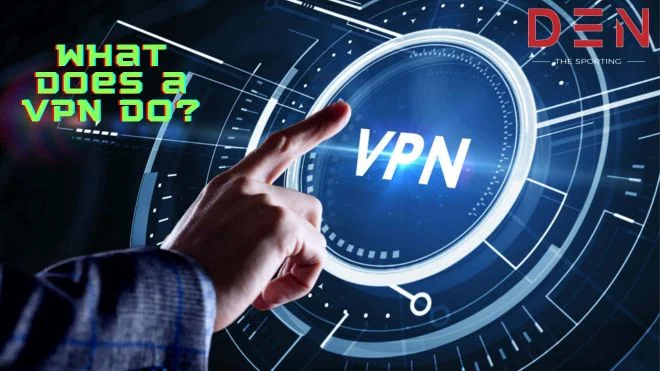
In the vast landscape of the internet, where data flows freely and digital footprints are left behind, the need for online security and privacy has never been more crucial. In this context, Virtual Private Networks, or VPNs, emerge as powerful tools that offer a shield against cyber threats and a cloak for safeguarding one’s digital identity. Find out “What is a VPN?” in this article.
Understanding VPN: Unveiling the Concept
A VPN, which stands for Virtual Private Network, serves as a protective layer between your device and the internet. It accomplishes this by establishing a secure, encrypted connection to a remote server. This connection acts as a private tunnel, ensuring that your data travels safely from your device to the destination server without being intercepted by malicious entities.
How Does a VPN Work?
At its core, a VPN operates by masking your actual IP address. Instead of revealing your device’s identity to the internet, a VPN reroutes your traffic through a remote server, making it appear as if the data originates from that server. This not only conceals your IP address but also encrypts the data, rendering it unreadable to anyone attempting to intercept it.
Benefits of VPN Connection: Safeguarding Your Digital Realm
1. Enhanced Security: Shielding Against Cyber Threats
The primary advantage of using a VPN lies in the robust security it provides. By encrypting your internet traffic, a VPN ensures that even if intercepted, your data remains indecipherable. This protects against hacking attempts, identity theft, and other cyber threats.
2. Anonymity and Privacy: Concealing Your Digital Footprint
VPNs offer users the ability to surf the internet with a level of anonymity. Through the use of remote servers and encrypted connections, VPNs shield your online activities from prying eyes, including your Internet Service Provider (ISP), advertisers, and potential cybercriminals.
3. Bypassing Geo-Restrictions: Accessing Content Anywhere
Another compelling feature of VPNs is their capacity to bypass geographical restrictions. Whether you want to access region-restricted content or navigate through censorship barriers, a VPN allows you to connect to servers in different locations, providing unrestricted access to online content.
4. Secure Data Transfer: Protecting Sensitive Information
For individuals working remotely or accessing sensitive company data, VPNs offer a secure conduit for data transfer. This is particularly crucial when connecting to public Wi-Fi networks, where the risk of data interception is higher.
ALSO READ: Best VPNs for Streaming Sports in 2024
Types of VPNs: Navigating the Options
1. SSL VPNs: Secure Remote Access
SSL VPNs, or Secure Socket Layer VPNs, are commonly used for secure remote access. This type of VPN relies on the web browser to establish a secure connection to the VPN gateway. It’s a preferred choice for businesses, enabling employees to access company resources securely from remote locations.
2. Site-to-Site VPNs: Interconnecting Networks
Site-to-Site VPNs are instrumental in connecting different networks securely. Often employed by large organizations with multiple locations, these VPNs ensure that data can flow securely between distinct intranets or local area networks (LANs).
3. Client-to-Server VPNs: User-Focused Encryption
For individual users seeking a secure connection, Client-to-Server VPNs are the go-to solution. These VPNs require the installation of client software on the user’s device, establishing a secure link to the VPN server. This type is widely used for personal online security.
Installing a VPN: Navigating the Setup
1. VPN Clients: User-Friendly Setup
Installing a VPN client involves downloading and configuring dedicated software on your device. This software, provided by the VPN service, simplifies the process, guiding users through the setup and ensuring a secure connection.
2. Browser Extensions: Quick Surfing Security
For those seeking simplicity in securing their browser activities, VPN browser extensions are available. These extensions add a layer of security to your online experience, although they may not provide comprehensive protection beyond the browser.
3. Router VPN: Safeguarding All Connected Devices
Router VPNs are suitable for users with multiple devices connected to the same network. By implementing a VPN directly on the router, all devices sharing the internet connection benefit from the encrypted tunnel, ensuring comprehensive security.
4. Company VPN: Tailored Solutions for Enterprises
Companies often deploy custom VPN solutions, creating a secure network infrastructure for employees. IT teams configure these VPNs to ensure secure connections to the company’s intranet and servers, maintaining the integrity of sensitive corporate data.
Ensuring VPN Security: Critical Considerations
1. Encryption Protocols: Safeguarding Data Integrity
Choosing a VPN with robust encryption protocols is paramount. Industry-standard protocols like OpenVPN or IKEv2/IPsec ensure that your data remains secure during transit, minimizing the risk of unauthorized access.
2. Kill Switch Feature: Preventing Data Exposure
A reliable VPN should include a kill switch feature. This functionality detects sudden VPN connection interruptions and terminates preselected programs, preventing data exposure in the event of a disruption.
3. Two-Factor Authentication: Adding an Extra Layer
For enhanced security, opt for VPN services that offer two-factor authentication. This additional layer of verification, often involving a code sent to your mobile device, fortifies your connection against unauthorized access.
The Evolution of VPNs: From Origins to Modern Usage
1. Early Efforts: ARPANET and Encryption Protocols
The groundwork for VPNs traces back to the 1960s when the U.S. Department of Defense initiated projects focusing on the encryption of internet communication data. The development of ARPANET and protocols like swIPe and IPSec laid the foundation for secure online communication.
2. Rise of Consumer VPNs: Addressing Security Concerns
While early VPNs were predominantly used by corporations, the surge in cyber threats in the early 2010s fueled the adoption of VPNs by individual users. The need for online privacy and protection against security breaches drove the consumer market for VPN services.
3. Contemporary VPN Usage: Global Trends
In recent years, the global adoption of VPNs has witnessed a substantial increase. Countries with restricted internet access, such as China and Indonesia, exhibit high VPN usage rates. Additionally, the demand for VPNs surged due to content streaming services with geographical restrictions.
VPN on Smartphones: Extending Security to Mobile Devices
1. Mobile VPN Solutions: Protection on the Go
With the proliferation of smartphones, VPN providers have extended their services to mobile platforms. Mobile VPN solutions, available through app stores, allow users to secure their mobile data traffic and maintain privacy while on the move.
2. Installation on Smartphones: User-Friendly Process
Installing a VPN on a smartphone involves downloading a dedicated app from the respective app store. The setup is typically user-friendly, requiring users to log in and follow guided steps for configuring key VPN functions.
VPN Security Realities: Unveiling Limitations
While VPNs offer robust security features, it’s essential to recognize their limitations. A VPN, on its own, does not provide comprehensive protection against malware, Trojans, or viruses. To ensure holistic security, combining a VPN with reputable antivirus software is recommended.
Choosing a Trusted VPN Provider: Key Considerations
Selecting a VPN provider demands careful consideration. Since the VPN provider can potentially access your internet traffic, trustworthiness is paramount. Opt for providers with a commitment to user privacy and a transparent data usage policy, prioritizing your security.
ALSO READ: 5 Best VPNs for Kodi in 2024 – A Comprehensive Guide
Conclusion: Navigating the Digital Frontier with Confidence
In the dynamic landscape of the internet, where threats loom and privacy is paramount, a VPN emerges as a stalwart companion. From securing your data against cyber threats to enabling seamless access to global content, a VPN empowers users to navigate the digital frontier with confidence. As technology evolves, the role of VPNs in preserving digital security and privacy will continue to be integral, ensuring a safer online experience for users worldwide.
Jim Munro, distinguished in sports commentary, crafts precision words mirroring athletes’ grace on the American field. Transforming analysis into riveting performances, he elevates the ordinary to the extraordinary. With wit and wisdom, Munro offers a fresh perspective, capturing moments from the crack of the baseball bat to the finesse of golf swings and the thunderous excitement of American football. His insightful commentary transcends the commonplace, providing a deeper understanding of athletic intricacies. Brace for an exhilarating journey into Munro’s realm, where sports commentary is a finely tuned art form, and each match unfolds as a captivating chapter in an epic narrative. Welcome to the unparalleled realm of Jim Munro, where his artistry in sports commentary is extraordinary.



